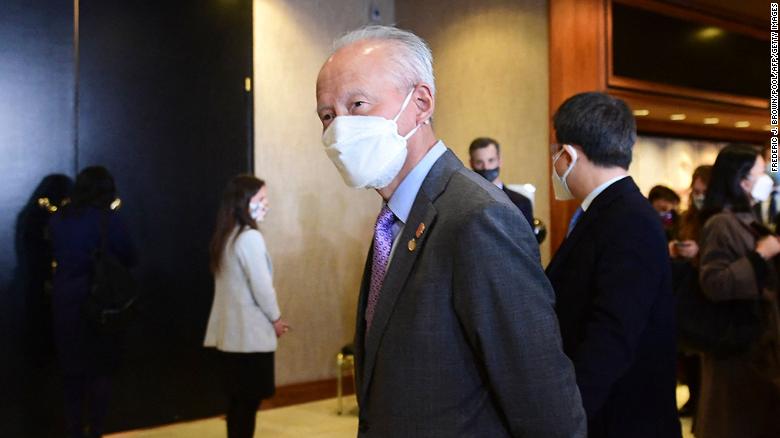Is a 'Cold War' really emerging between China and the US?
A new generation of US cold warriors just got some powerful validation.
A new generation of US cold warriors just got some powerful validation.


This story is part of CNN's commitment to covering issues around identity, including race, gender, sexuality, religion, class and caste.
London (CNN)Aima, 19, is one of Britain's most prominent Black Lives Matter (BLM) activists, but at a protest in London she is nervous. She has her hood up and, while a pandemic-mandated mask covers most of her face, she keeps her head down for fear of being recognized. Her eyes constantly dart to check the location of the police.





Hong KongEditor's note: CNN has launched the Meanwhile in China newsletter, a three-times-a-week update exploring what you need to know about the country's rise and how it impacts the world. Sign up here.

Joe Biden's first overseas trip as US President -- a whistle-stop diplomatic tour of Europe -- achieved its primary goal of signaling to America's closest friends that it was ready once moreto lead the Western alliance.




(CNN)Daredevil Alex Harvill died Thursday while practicing for a world record motorcycle ramp jump, officials in Washington state said. He was 28 years old.
Motorcycle stuntman Alex Harvill died Thursday while practicing for a world record jump at a Washington state airport, the Grant County Coroner’s Office confirmed.
Harvill, 28, was trying to break the Guinness World Record for the longest motorcycle ramp jump – 351 feet – when he crashed.
Graphic video taken at the Moses Lake Airshow shows the Ephrata, Washington resident launch off the ramp during a warm up run and come up short, slamming into the side of a large dirt mound.
The crash sent Harvill flying over the handlebars of his Suzuki 450 and flipping dozens of feet forward. It’s not yet clear if he died at the scene or was pronounced dead after first responders https://dmschools.instructure.com/courses/244497/pages/watch-joe-bell-2021-online-movie-full-hd-freetook him to the hospital.
Born in Corona, California, Harvill was an experienced rider who had already achieved a world record jump – as a 19-year-old he shattered a ramp to dirt record of 392 feet by landing a 425-foot jump on May 12, 2012. He also held the longest dirt to dirt motorcycle jump at 297 feet after clearing the gap atHorn Rapids Motorsports Complex in West Richland, Washington.
“Our deepest sympathies go out to Alex’s family, friends and loved ones,” the Grant County Sheriff’s Office wrote on Twitter Thursday.
Harvill is survived by his wife Jessica and his children, 5-year-old Willis and newborn Watson, according to the Columbia Basin Herald.
The crash sent Harvill flying over the handlebars of his Suzuki 450 and flipping dozens of feet forward. It’s not yet clear if he died at the scene or was pronounced dead after first responders took him to the hospital.
Born in Corona, California, Harvill was an experienced rider who had already achieved a world record jump – as a 19-year-old he shattered a ramp to dirt record of 392 feet by landing a 425-foot jump on May 12, 2012. He also held the longest dirt to dirt motorcycle jump at 297 feet after clearing the gap at Horn Rapids Motorsports Complex in West Richland, Washington.
“Our deepest sympathies go out to Alex’s family, friends and loved ones,” the Grant County Sheriff’s Office wrote on Twitter Thursday.
Daredevil motorcycle rider Alex Harvill died in a crash Thursday while practicing for a record jump.
Harvill, 28, was practicing at the Grant County International Airport in Moses Lake, Washington, when the accident occurred, according to the Grant County Coroner's Office.
The record jump was set to take place at the Moses Lake Airshow on Thursday morning, but he was fatally injured in a warmup jump prior to the record attempt. It was the first scheduled event of the three-day show.
Harvill was attempting to break the distance record for longest motorcycle jump, set at 351 feet by Robbie Maddison in March 2008.
"Our deepest sympathies go out to Alex's family, friends and loved ones," the sheriff's office said in a statement.

An autopsy was set to be performed on Friday, according to the Grant County coroner.
"We regret to report today at our first event of the airshow -- the Guinness World Record Jump Attempt, Alex Harvill was injured during his warm-up before the jump and has been taken to the hospital," the Moses Lake Airshow said in a statement on its Facebook page. "We do not have more information at this time regarding the incident."
Harvill, who lived in Ephrata, Washington, was married and had a son, Watson, just last month. He also had an older son named Willis.
Maddison posted a remembrance for Harvill on Thursday evening, saying he was "shattered" by the news.
"[He] was out to set a new world record today when he paid the ultimate price," Maddison wrote on Instagram. "My heart is broken for his family. Sending our love To Jessica, Willy and Watson."
"I've been riding since I was 4, but before that, I would ride on the front of my dad's bike," Harvill told the Columbia Basin Herald in an interview last month about the record jump. "My entire life I've ridden dirt bikes and looked up to everyone that races dirt bikes and think of those guys as heroes."
He already held the record for dirt to dirt distance jump at just over 297 feet, set in 2013.
He has also competed in motocross and supercross racing in addition to distance jumps and stunt work.
It then appears that Harvill is tossed forward from the bike, much to the shock of people witnessing the moment.
Spectators watching the stunt could be heard groaning as the video comes to an end.
The Grant County Coroner said that Harvill, 28, was attempting a practice jump when thecrash occurred, with the injuries ultimately resulting in his death.
'Our deepest sympathies go out to Alex’s family, friends and loved ones,' the Grant County Sherriff's Office said on Facebook.
After the crash, the airshow where the jump was taking place vowed on Facebook to donate proceeds from the jump towards medical expenses for Harvill.